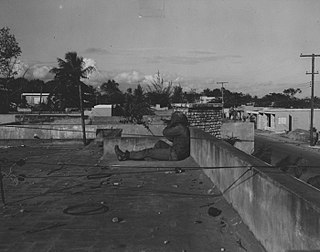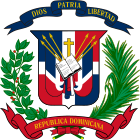
Joaquín Antonio Balaguer Ricardo was a Dominican politician, scholar, writer, and lawyer. He was President of the Dominican Republic serving three non-consecutive terms for that office from 1960 to 1962, 1966 to 1978, and 1986 to 1996.

Rafael Leónidas Trujillo Molina, nicknamed El Jefe ), was a Dominican military commander and dictator who ruled the Dominican Republic from August 1930 until his assassination in May 1961. He served as president from 1930 to 1938 and again from 1942 to 1952, ruling for the rest of his life as an unelected military strongman under figurehead presidents. His rule of 31 years, known to Dominicans as the Trujillo Era, was one of the longest for a non-royal leader in the world, and centered around a personality cult of the ruling family. It was also one of the most brutal; Trujillo's security forces, including the infamous SIM, were responsible for perhaps as many as 50,000 murders. These included between 12,000 and 30,000 Haitians in the infamous Parsley massacre in 1937, which continues to affect Dominican-Haitian relations to this day.

The Dominican Liberation Party is a political party in the Dominican Republic. Founded in 1973 by former president Juan Bosch, the party, along with the Dominican Revolutionary Party, and Social Christian Reformist Party, has dominated politics in the country since the establishment of democracy in the early 1960s.
The Dominican honours system is a means of rewarding individuals' personal bravery, achievement or service to the Dominican Republic. The system consists of two types of awards: decorations and medals.

Rafael Filiberto Bonnelly Fondeur was a lawyer, scholar, diplomat, and, from 1962 until 1963, the President of the Dominican Republic. Before he became president, he was vice president of the country from 1960 to 1962.
The Parsley massacre was a mass killing of Haitians living in the Dominican Republic's northwestern frontier and in certain parts of the contiguous Cibao region in October 1937. Dominican Army troops from different areas of the country carried out the massacre on the orders of Dominican dictator Rafael Trujillo. As a result of the massacre, virtually the entire Haitian population in the Dominican frontier was either killed or forced to flee across the border. Many died while trying to flee to Haiti across the Dajabón River that divides the two countries on the island; the troops followed them into the river to cut them down, causing the river to run with blood and corpses for several days. The massacre claimed the lives of an estimated 14,000 to 40,000 Haitian men, women, and children. Dominican troops interrogated thousands of civilians demanding that each victim say the word "parsley" (perejil). If the accused could not pronounce the word to the interrogators' satisfaction, they were deemed to be Haitians and killed.
The Dominican Party was the de facto only permitted political party in the Dominican Republic during the dictatorship of Rafael Trujillo, who ruled the country from 1930 to 1961. Its symbol was a palm tree.

Jacinto Bienvenido Peynado Peynado was the president of the Dominican Republic from August 16, 1938, until February 24, 1940, during the Trujillo era. During his 31-year regime, dictator Rafael Trujillo appointed four individuals to serve as ceremonial presidents while retaining direct, behind-the-scenes control of the executive branch. Prior to ascending to the presidency, Peynado served as Trujillo's vice president from 1934 to 1938.

Juan Rafael Estrella Ureña was a Dominican politician and lawyer. He served as the last acting president of the Dominican Republic from March 3, 1930, until August 16, 1930, when he started to serve as the vice president under Rafael Leónidas Trujillo.

General elections were held in the Dominican Republic on 16 May 1930. They were held three months after President Horacio Vásquez was deposed in a coup led by Rafael Estrella Ureña. In a deal with Estrella, Dominican Army commander Rafael Trujillo kept his men in barracks under the pretense of "neutrality," clearing the way for Estrella to take over as provisional president. In return, Trujillo was allowed to run for president in the May elections. During the campaign, other candidates, as well as election officials, were subjected to severe harassment by Trujillo's soldiers. The other candidates withdrew when it became clear that Trujillo would be the only candidate allowed to campaign unhindered, leaving him to win the presidency unopposed. The Confederation of Parties, a pro-Trujillo grouping, won every seat in the Congressional elections.

General elections were held in the Dominican Republic on 16 May 1934. Two years earlier, the Dominican Party of President Rafael Trujillo had been declared the only legally permitted party. However, the country had effectively been a one-party state since Trujillo assumed office in 1930.

General elections were held in the Dominican Republic on 16 May 1938. At the time, the country was a single-party state, with the Dominican Party as the only legally permitted party.

General elections were held in the Dominican Republic on 16 May 1942. Rafael Trujillo, the country's de facto leader since 1930, was the sole presidential candidate and was returned to office unopposed. His Dominican Party won every seat in the Congressional elections.

General elections were held in the Dominican Republic on 16 May 1947. For the first time since the 1924 elections, and the only time during the three-decade rule of Rafael Trujillo, there was still more than one presidential candidate by election day. However, incumbent president Trujillo was re-elected after receiving 93% of the vote. His Dominican Party won every seat in the Congressional elections, as it had at every election since its founding.

General elections were held in the Dominican Republic on 16 May 1957. Incumbent Héctor Trujillo was the only candidate in the presidential election, and was unopposed for a second term. However, his predecessor and brother Rafael Trujillo, the country's de facto leader since 1930, maintained absolute control of the country. The Dominican Party won every seat in the Congressional elections.

General elections were held in the Dominican Republic on 20 December 1962. They were the first after the end of the Rafael Trujillo dictatorship two years earlier, as well as the first with no military candidates for president since 1938. They are generally regarded to be the first free elections in the country's history.

Luis José Ramfis Rafael Domínguez-Trujillo, also known as Ramfis Domínguez-Trujillo is a politician.
Rafael Ángel Brache Ramírez was a politician, civil servant, and diplomat from the Dominican Republic. His career in national politics spanned from 1914 to 1935, after which he spent much of his life in exile.
The 1963 Dominican coup d'état was a coup d'état that took place on September 25, 1963 against President Juan Bosch in the Dominican Republic. Juan Bosch had been the first democratically elected president after the assassination of the former dictator Rafael Trujillo, but he faced criticism due to his policies, which were seen as leftist. This led to a coup that replaced his government with a military junta; which itself would be replaced with a civilian junta.

The Mission of the Representative of the Secretary-General in the Dominican Republic (DOMREP) was a peacekeeping operation established in 1965 by the UN to observe the ceasefire agreement between the two de facto authorities in the Dominican Republic during the Dominican Civil War. DOMREP was instructed to report any breaches of the agreements between the Constitutionalists led by Juan Bosch and Francisco Caamaño, and Loyalists commanded by Elías Wessin y Wessin and backed by the United States. Once the new Dominican constitutional government was formed, DOMREP withdrew.













